The dream used to seem impossible: work remotely while exploring Europe, using the advantage of speaking multiple languages, and building a life in a new culture. Fast forward to 2025, and thousands of multilingual professionals are doing exactly that.
Europe has become the ultimate playground for remote workers who speak multiple languages:
✔️ Excellent internet speeds
✔️ Affordable cost of living in many cities
✔️ Thriving expat communities
✔️ Rich cultural experiences
The continent checks every box.
The real question is which European city matches your lifestyle, budget, and language skills?
This guide reveals 11 European cities where multilingual professionals thrive, breaking down cost of living, digital infrastructure, language opportunities, visa requirements, and community vibes.
You'll learn which cities offer the best value, where your language skills matter most, and how to choose your perfect European base.
Let’s get to it.
Why Europe Dominates for Remote Multilingual Work?
European cities have invested heavily in digital infrastructure. Average internet speeds across Western Europe exceed 100 Mbps. Many Eastern European cities boast fiber connections faster than major US cities. Coworking spaces have multiplied across the continent.
Remote work infrastructure goes beyond fast internet. Most European cities offer reliable public transportation, extensive cafe culture with strong WiFi, and business-friendly environments. Working from a Lisbon cafe or a Berlin coworking space feels seamless.
Language diversity as a career asset
Europe operates in dozens of languages daily. Your multilingual skills transform from nice-to-have into genuine competitive advantages. Companies across Europe actively seek professionals who can communicate across linguistic borders.
Speaking German, French, Spanish, or Italian opens doors throughout the continent. English serves as the business lingua franca, but adding regional languages multiplies your opportunities. Customer service, sales, marketing, and tech support roles constantly need multilingual talent.
How We Selected These Cities?
We evaluated cities based on factors that directly impact remote workers:
-
Cost of living: Rent, food, transportation, and entertainment expenses
-
Digital infrastructure: Internet speeds, coworking spaces, cafe culture
-
Language opportunities: Multilingual job markets and daily language practice
-
Visa friendliness: Digital nomad visas, residence permits, and ease of settling
-
Community: Expat networks, meetup culture, and social opportunities
-
Quality of life: Safety, healthcare, climate, and cultural activities
The balance between affordability and lifestyle
Some cities offer rock-bottom prices but limited career opportunities. Others provide incredible networking but drain your savings quickly. The cities on this list strike a balance between financial sustainability and quality of life.
We focused on cities where multilingual professionals can live comfortably on €2,000-€4,000 monthly while building careers and communities.
Let’s uncover the specifics for each city.
1. Lisbon, Portugal
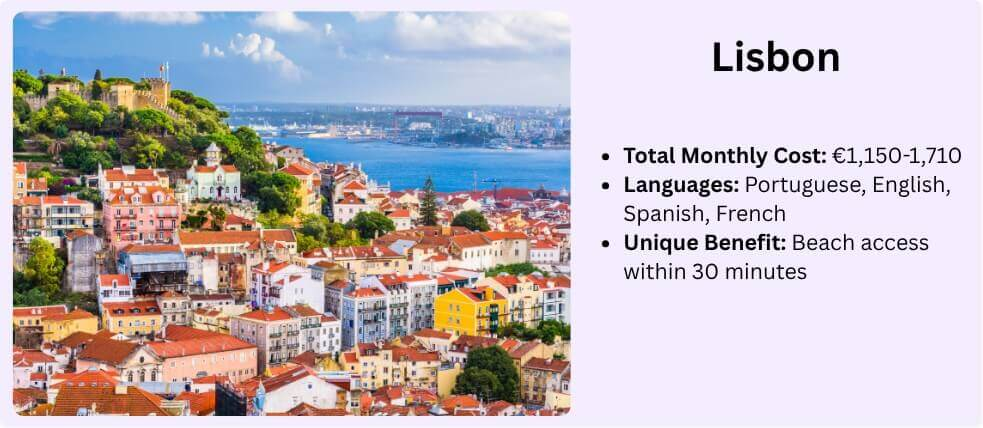
Lisbon has exploded as a remote work hub over the past five years. The combination of year-round sunshine, affordable living, and a thriving startup scene makes it irresistible. Portuguese locals generally speak excellent English, but your Portuguese, Spanish, or French skills add value in customer-facing roles.
The city pulses with energy. Colorful neighborhoods climb steep hills. Historic trams wind through narrow streets. Beach towns sit just 30 minutes away. The work-life balance feels effortless.
Cost of Living:
-
One-bedroom apartment in city center: €900-1,400/month
-
Meal at mid-range restaurant: €12-18
-
Monthly public transport pass: €40
-
Coworking space: €150-250/month
Language Landscape: Portuguese dominates daily life, but English works everywhere in business contexts. Spanish speakers catch on quickly. French has historical connections. Many startups operate entirely in English while serving European markets.
Digital Infrastructure: Fiber internet widely available with speeds up to 1 Gbps. Dozens of coworking spaces across neighborhoods. Cafe culture embraces laptop workers. Mobile data plans remain affordable.
Visa Situation: Portugal offers a Digital Nomad Visa (D8) for remote workers earning at least €3,280 monthly. The visa allows one year of residence with renewal options. EU citizens enjoy full freedom of movement.
Pro Tip: Join Lisbon Digital Nomads or Lisbon Expats groups on Facebook before arriving. These communities organize weekly meetups, apartment hunting tips, and social events.
2. Valencia, Spain

Barcelona and Madrid grab headlines, but Valencia offers better value with similar quality of life. This coastal city combines Mediterranean beaches, incredible food, and a growing tech scene. Speaking Spanish becomes essential for deep cultural integration, but English works in international companies.
Valencia feels more authentically Spanish than Barcelona. Locals practice less English, pushing you to improve your Spanish. The slower pace of life contrasts with Madrid's intensity while maintaining professional opportunities.
Cost of Living:
-
One-bedroom apartment in city center: €700-1,000/month
-
Meal at mid-range restaurant: €10-15
-
Monthly public transport pass: €45
-
Coworking space: €120-200/month
Language Landscape: Spanish dominates everything. Valenciano (Catalan dialect) appears in official contexts. English works in tech companies and international businesses.
Digital Infrastructure: Reliable fiber internet throughout the city. Growing number of coworking spaces. Beach-side cafes welcome remote workers. 5G coverage expanding rapidly.
Visa Situation: Spain launched its Digital Nomad Visa in 2023. Requirements include earning at least €2,160 monthly and working for companies outside Spain. The visa grants one year of residence with extension possibilities.
Local Insight: Valencia's expat community organizes language exchanges three times weekly. Perfect for practicing Spanish while meeting other multilingual professionals.
3. Berlin, Germany
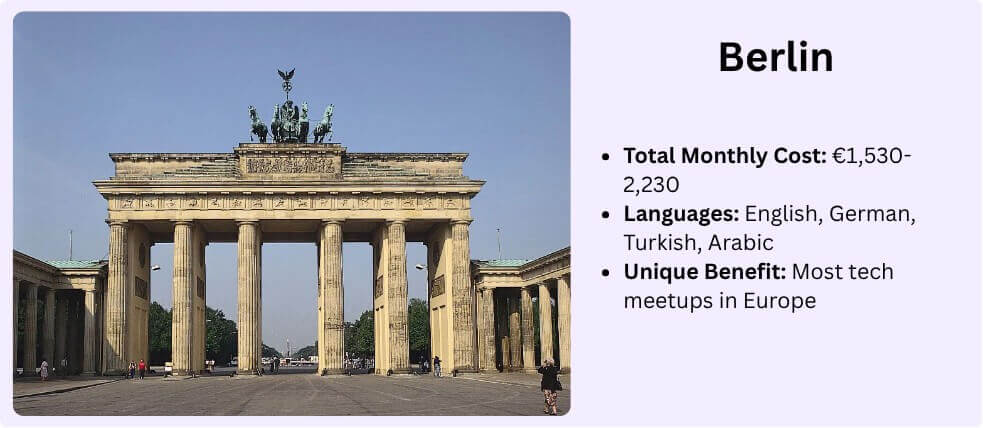
Berlin attracts entrepreneurs, creatives, and tech professionals from across the globe. The city operates largely in English within professional circles, but German skills open more doors. International companies cluster here specifically because of the multilingual talent pool.
The city never sleeps. Museums, galleries, nightclubs, and restaurants operate around the clock. History meets modernity on every corner. The energy feels electric yet somehow affordable compared to other European capitals.
Cost of Living:
-
One-bedroom apartment in city center: €1,200-1,800/month
-
Meal at mid-range restaurant: €12-20
-
Monthly public transport pass: €58
-
Coworking space: €200-350/month
Language Landscape: English functions as the business language in most startups and tech companies. German helps with bureaucracy, socializing with locals, and accessing more opportunities. Turkish and Arabic communities add linguistic diversity.
Digital Infrastructure: Excellent internet infrastructure despite some rural Germany lag. Hundreds of coworking spaces across districts. Cafe culture accommodates all-day laptop sessions. Mobile coverage is strong throughout.
Visa Situation: Germany offers a Freelance Visa (Freiberufler) for self-employed professionals. Requirements include demonstrating stable income and obtaining necessary permits. EU citizens face no restrictions.
Networking Goldmine: Berlin hosts more tech meetups than any other European city. Language-specific networking events happen weekly across the city.
4. Prague, Czech Republic
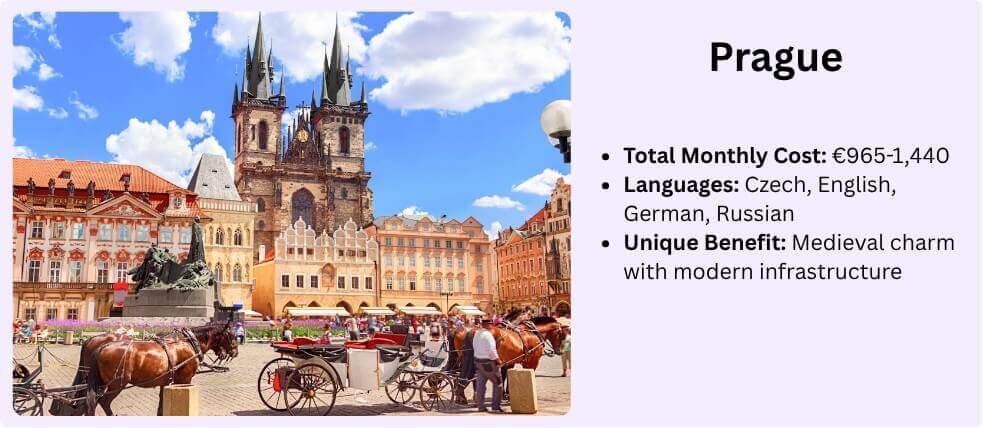
Prague delivers fairytale architecture at Central European prices. The city has modernized rapidly while maintaining its historic character. English works in international companies, but Czech language skills make daily life smoother and open local opportunities.
The Vltava River divides ancient and modern Prague. Castle views dominate the skyline. Beer costs less than water. The city feels both romantic and practical.
Cost of Living:
-
One-bedroom apartment in city center: €800-1,200/month
-
Meal at mid-range restaurant: €8-12
-
Monthly public transport pass: €25
-
Coworking space: €100-180/month
Language Landscape: Czech dominates daily interactions. English works in expat circles and international companies. German speakers find connections in business contexts. Russian occasionally helps with older generations.
Digital Infrastructure: Fast, reliable internet throughout Prague. Growing coworking scene. Mobile data plans remain extremely affordable.
Visa Situation: Czech Republic offers a long-term visa for freelancers and entrepreneurs. The process requires more paperwork than Western European countries but remains achievable. Living costs make the bureaucracy worthwhile.
By the Numbers: Prague's expat community has grown 40% since 2020, with multilingual professionals representing the fastest-growing segment.
5. Tallinn, Estonia
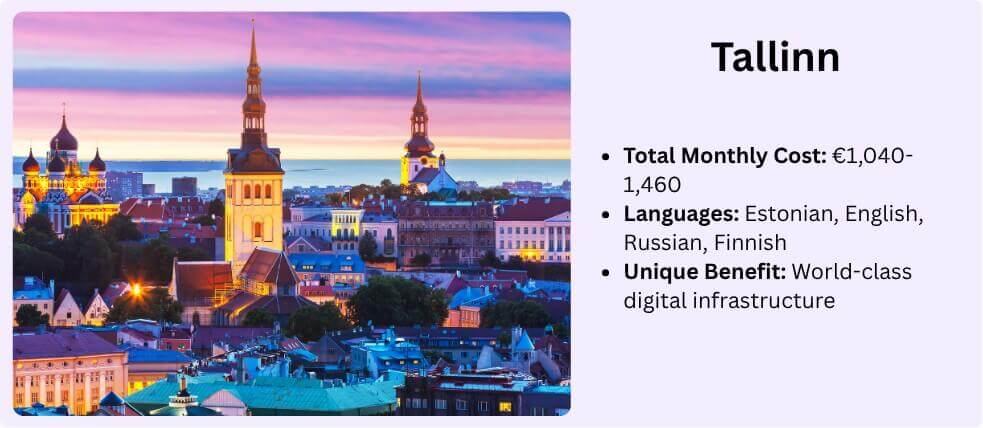
Estonia built the world's most advanced digital government. E-residency allows anyone to establish and run an EU company remotely. The tech scene thrives despite the small population. English dominates professional environments, but Estonian, Russian, and Finnish add value.
Tallinn blends medieval Old Town charm with Nordic modernity. The Baltic Sea provides natural beauty. The city feels safe, clean, and remarkably efficient.
Cost of Living:
-
One-bedroom apartment in city center: €700-1,000/month
-
Meal at mid-range restaurant: €12-18
-
Monthly public transport pass: €23
-
Coworking space: €150-220/month
Language Landscape: English works everywhere professionally. Estonian dominates official contexts. Russian speakers comprise about 25% of the population. Finnish understood by many. Your multilingual skills truly shine here.
Digital Infrastructure: World-class digital infrastructure. Free public WiFi throughout the city. Advanced tech ecosystem. Lightning-fast internet speeds standard. Mobile coverage exceptional.
Visa Situation: Estonia offers a Digital Nomad Visa allowing up to one year of residence. Requirements include earning at least €3,504 monthly. E-residency provides business opportunities without physical presence.
Startup Scene: Tallinn produced Skype, Wise, and Bolt. The startup density per capita ranks among Europe's highest. Perfect for multilingual professionals in tech.
6. Porto, Portugal

Porto offers everything Lisbon provides with fewer crowds and lower prices. The Douro River runs through granite and tile architecture. Port wine cellars line the waterfront. The tech scene grows steadily. English, Portuguese, Spanish, and French all find professional applications.
Porto feels more intimate than Lisbon. Neighborhoods maintain local character despite growing international attention. The pace of life moves slower. Community bonds form easily.
Cost of Living:
-
One-bedroom apartment in city center: €650-1,000/month
-
Meal at mid-range restaurant: €10-15
-
Monthly public transport pass: €40
-
Coworking space: €130-200/month
Language Landscape: Portuguese dominates daily life more than Lisbon. English works professionally but less universally spoken. Spanish comprehension high. French colonial connections remain. Learning Portuguese becomes essential.
Digital Infrastructure: Excellent fiber internet. Growing coworking spaces. Cafe culture developing. Mobile coverage strong throughout metro area.
Visa Situation: Same Digital Nomad Visa as Lisbon applies. Portugal's residence-by-investment program also exists. EU citizens move freely.
Job Market: Porto's customer service sector actively recruits multilingual professionals for major European companies. Your language combination could land immediate opportunities.
7. Barcelona, Spain
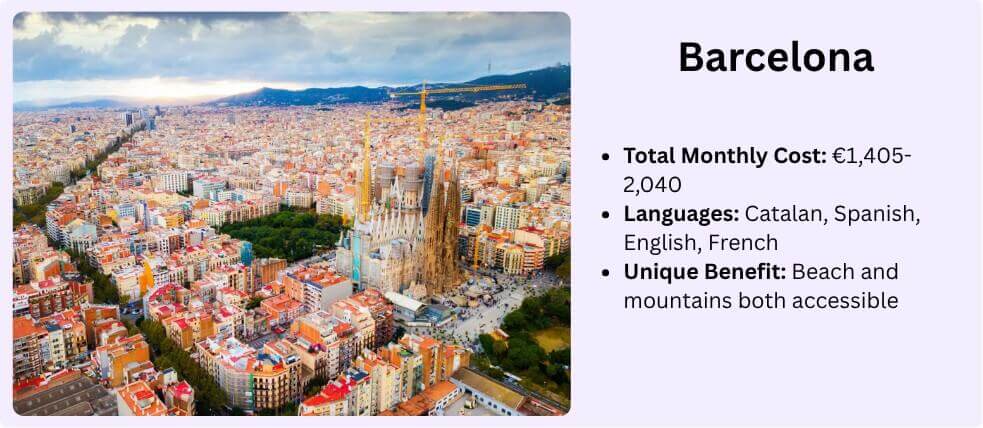
Barcelona needs little introduction. Gaudi's architecture draws millions annually. The beach meets urban sophistication. The startup ecosystem ranks among Europe's strongest. Catalan, Spanish, English, and French all matter professionally. The multilingual environment feels natural.
The city balances work and leisure perfectly. Beach breaks during lunch. Mountain hikes on weekends. World-class restaurants at every price point. Culture saturates daily life.
Cost of Living:
-
One-bedroom apartment in city center: €1,100-1,700/month
-
Meal at mid-range restaurant: €13-20
-
Monthly public transport pass: €40
-
Coworking space: €180-300/month
Language Landscape: Catalan and Spanish coexist officially. English dominates international business. French speakers find connections. Italian comprehension high. The multilingual environment trains your ear constantly.
Digital Infrastructure: Excellent internet infrastructure. Hundreds of coworking spaces. Beach bars offer WiFi. Mobile coverage strong throughout.
Visa Situation: Spain's Digital Nomad Visa applies. Barcelona's popularity means higher competition for apartments and resources. Planning ahead becomes essential.
Reality Check: Barcelona's popularity has driven up costs significantly. Budget carefully and consider neighborhoods outside the city center for better value.
8. Budapest, Hungary
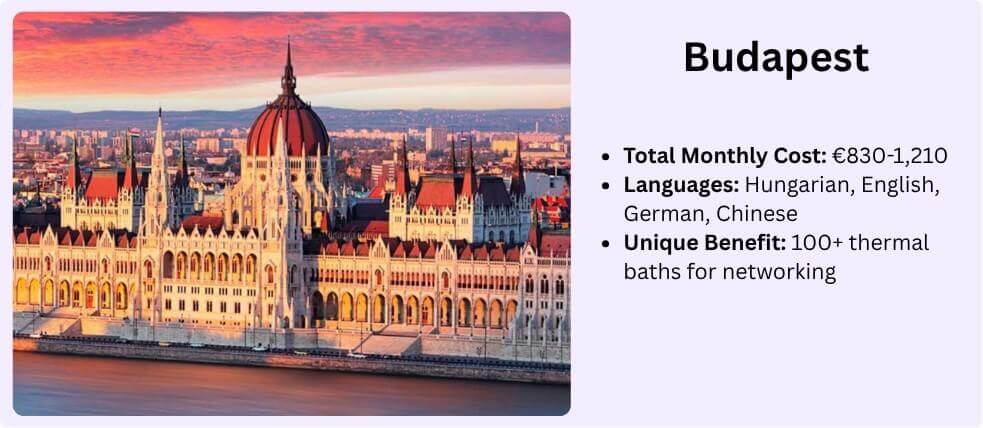
Budapest straddles the Danube River with distinct Buda and Pest sides. Thermal baths offer relaxation after work. The ruin bar scene provides nightlife. Tech companies cluster in the city center. English works professionally, while Hungarian, German, and increasingly Chinese create opportunities.
The city combines imperial grandeur with gritty authenticity. Architecture stuns around every corner. Food culture celebrates hearty traditions. Value for money exceeds most European capitals.
Cost of Living:
-
One-bedroom apartment in city center: €600-900/month
-
Meal at mid-range restaurant: €8-12
-
Monthly public transport pass: €30
-
Coworking space: €100-180/month
Language Landscape: Hungarian challenges even experienced language learners. English works in business contexts. German has historical significance. Chinese business presence growing. Your multilingual background provides significant advantages.
Digital Infrastructure: Fast fiber internet widely available. Growing coworking culture. Traditional cafes accommodate remote workers. Mobile data plans affordable.
Visa Situation: Hungary offers a White Card residence permit for highly skilled workers. The process requires employer sponsorship or freelance documentation. Digital nomad specific visa under development.
Unique Advantage: Budapest's thermal bath culture provides networking opportunities unlike any other European city. Business discussions happen in 40-degree pools.
9. Amsterdam, Netherlands
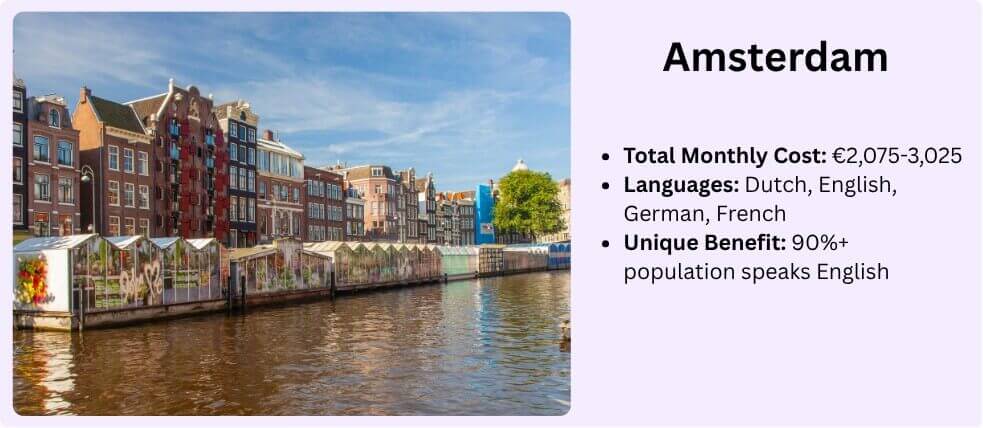
Amsterdam operates largely in English despite being a Dutch city. International companies cluster here specifically for multilingual talent access. Dutch, English, German, and French all matter professionally. The cycling infrastructure makes daily life easy. Canals and architecture create unique urban beauty.
The city feels cosmopolitan and compact. Everything stays within biking distance. Work-life balance receives cultural emphasis. Progressive attitudes permeate society.
Cost of Living:
-
One-bedroom apartment in city center: €1,500-2,300/month
-
Meal at mid-range restaurant: €15-25
-
Monthly public transport pass: €105
-
Coworking space: €250-400/month
Language Landscape: English functions as a second official language practically. Dutch dominates official contexts. German widely understood. French business connections strong. Your multilingual skills will find immediate application.
Digital Infrastructure: World-class internet infrastructure. Coworking spaces throughout the city. Cafe culture welcomes remote workers. Mobile coverage excellent.
Visa Situation: Netherlands offers highly skilled migrant visa programs. EU citizens face no restrictions. Housing shortage creates significant challenges. Start apartment hunting months before arriving.
Cost Warning: Amsterdam ranks among Europe's most expensive cities. The quality of life justifies costs for many, but budget carefully and explore surrounding towns for housing.
10. Krakow, Poland
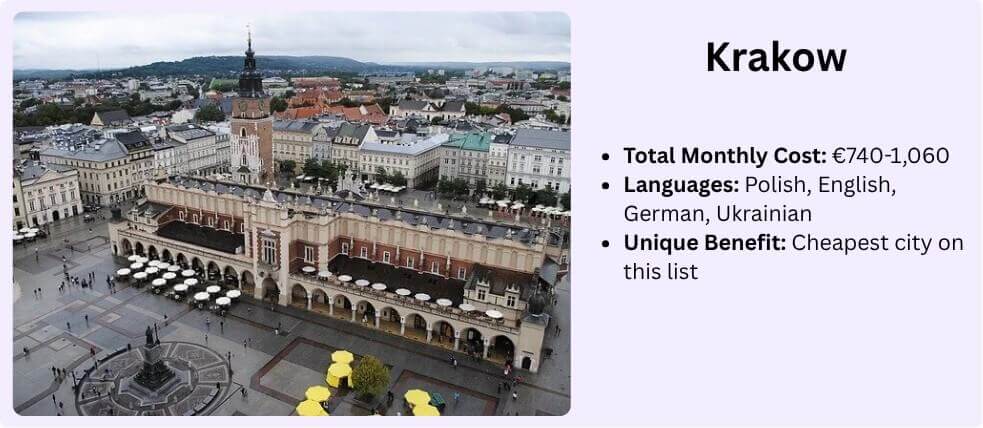
Krakow preserves centuries of history while embracing tech growth. The main square ranks among Europe's largest medieval squares. Living costs remain remarkably low. Business process outsourcing companies actively recruit multilingual professionals. Polish, English, German, and increasingly Ukrainian create professional opportunities.
The city maintains authentic Polish character despite growing international attention. History surrounds you constantly. Salt mines, castles, and UNESCO sites fill the region. Community feels strong.
Cost of Living:
-
One-bedroom apartment in city center: €550-800/month
-
Meal at mid-range restaurant: €7-11
-
Monthly public transport pass: €18
-
Coworking space: €90-150/month
Language Landscape: Polish dominates daily life. English works in business contexts and among younger generations. German has historical connections. Ukrainian community growing rapidly. Russian occasionally helps.
Digital Infrastructure: Reliable internet throughout the city. Growing coworking scene. Traditional cafes welcome laptop workers. Mobile data extremely affordable.
Visa Situation: Poland offers various residence permits for freelancers and employees. The process requires patience with bureaucracy. Living costs make effort worthwhile.
Language Learning: Krakow offers excellent Polish language courses for foreigners. Many multilingual professionals use the city as a base for mastering Polish while working remotely.
11. Athens, Greece
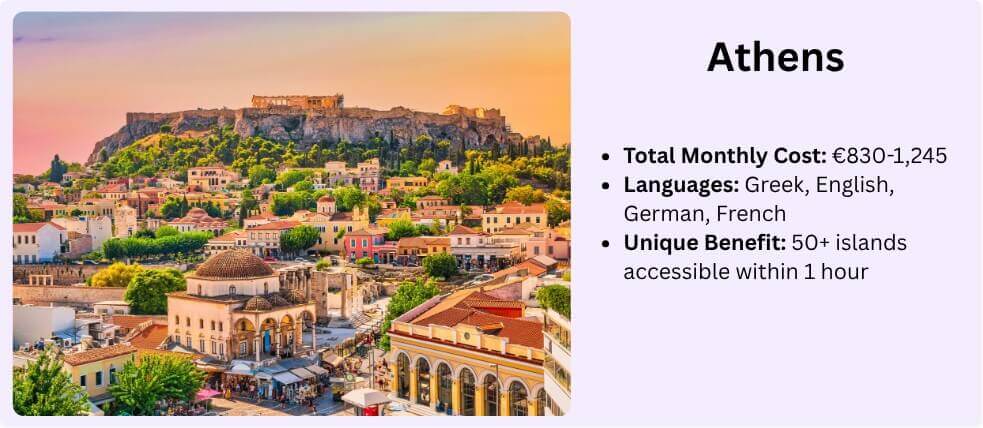
Athens combines archaeological wonders with growing tech opportunities. The economic challenges of past years created entrepreneurial spirit. Greek islands provide weekend escapes. Mediterranean climate ensures sunshine most of the year. Greek, English, and increasingly German and French matter professionally.
The city sprawls beneath the Acropolis. Markets bustle with energy. Beach suburbs offer resort living at city prices. History feels alive everywhere.
Cost of Living:
-
One-bedroom apartment in city center: €550-900/month
-
Meal at mid-range restaurant: €10-15
-
Monthly public transport pass: €30
-
Coworking space: €120-200/month
Language Landscape: Greek dominates daily interactions. English works in tourism and tech sectors. German business connections exist. French cultural ties remain. Learning basic Greek enriches the experience significantly.
Digital Infrastructure: Improved internet infrastructure post-economic crisis. Growing coworking culture. Cafe society embraces remote workers. Mobile coverage good in urban areas.
Visa Situation: Greece launched a Digital Nomad Visa in 2021. Requirements include earning at least €3,500 monthly. The visa allows one year of residence with extension possibilities.
Lifestyle Bonus: Athens provides the unique combination of urban work environment with island hopping capabilities. Friday afternoon trips reach dozens of Greek islands in under an hour.
Making Your Choice
Before choosing your destination, explore Europe Language Jobs, a job board connecting multilingual professionals with employers across Europe. It’s a great way to secure local or remote work before relocating.
Next, calculate your monthly remote income. Subtract 30% for savings and emergencies. The remainder should cover rent, food, transportation, entertainment, and travel. Cities like Krakow and Porto stretch budgets further. Amsterdam and Barcelona require higher earnings.
Create a realistic monthly budget:
-
Rent: 30-40% of income
-
Food and dining: 20-25%
-
Transportation: 5-10%
-
Entertainment and travel: 15-20%
-
Savings: 20-30%
Consider your language goals
Choose cities where you can practice target languages daily. Want to improve Spanish? Valencia pushes you more than Barcelona. Trying to learn Portuguese? Porto forces more Portuguese than Lisbon. Learning German? Berlin offers immersion with English safety net.
Evaluate visa requirements against your situation
EU citizens enjoy freedom of movement across all these cities. Non-EU citizens face varying requirements. Portugal and Spain offer relatively accessible digital nomad visas. Estonia provides innovative e-residency. Germany requires more documentation but opens Central European opportunities.
Research visa requirements thoroughly before committing. Processing times vary from weeks to months.
Test before committing
Spend one month in your top choice before signing long-term leases. Many surprises emerge only through daily living. The city that seems perfect online might not match your reality. The supposedly expensive city might feel worth every euro.
Use the first month to:
-
Explore different neighborhoods
-
Test coworking spaces
-
Meet expat communities
-
Experience local culture
-
Assess daily costs
Practical Tips for Settling In
Finding accommodation remotely
Start your apartment search 2-3 months before arrival. Use multiple platforms:
-
SpotAhome and HousingAnywhere for mid-term rentals
-
Airbnb for initial weeks while searching
-
Local Facebook groups for direct landlord connections
-
Real estate agencies for professional support
Expect to pay first month, last month, and security deposit upfront. Scams exist everywhere. Never send money before video touring the actual apartment. Request to speak directly with the landlord.
Building your professional network
Join language-specific professional groups immediately:
-
Internations organizes expat events in every city
-
Meetup.com hosts language exchanges and professional meetups
-
LinkedIn groups connect remote workers in specific cities
-
Facebook expat groups share opportunities and advice
Attend coworking space events even if you enjoy working from home. The connections made through casual coffee chats often lead to job opportunities, collaborations, and friendships.
Managing healthcare and insurance
EU citizens use European Health Insurance Card (EHIC) for basic coverage. Private health insurance provides better coverage and English-speaking doctors. Many cities have international medical centers catering to expats.
Budget €50-150 monthly for comprehensive private health insurance. Costs vary by age, coverage level, and country. Research options before arriving.
Managing taxes as a remote worker
Tax situations become complex quickly. Spending more than 183 days annually in most countries triggers tax residency. Working for foreign companies while residing abroad creates additional complications.
Consult with international tax advisors before moving. Using an Employer of Record in Portugal for example, can simplify tax compliance for you by handling local payroll, deductions, and reporting on your behalf. Costs range from €200-€600 but prevent expensive mistakes.
Common Challenges and Solutions
Loneliness and community building
Remote work in foreign cities can feel isolating initially. Combat loneliness actively:
-
Schedule weekly social commitments
-
Join sports clubs or hobby groups
-
Attend language exchange events
-
Volunteer with local organizations
-
Host dinners for fellow expats
Building community requires intentional effort. The investment pays dividends in friendship and professional connections.
Dealing with bureaucracy
European bureaucracy varies wildly by country. Southern and Eastern European countries generally require more patience. Solutions:
-
Hire local facilitators for complex processes
-
Join expat groups for step-by-step guidance
-
Allow double the expected time for any official process
-
Keep multiple copies of all documents
-
Maintain calm and polite persistence
Time zone challenges
Working across time zones requires boundary setting. Your 9 AM might be someone else's midnight. Solutions:
-
Clearly communicate your working hours
-
Use scheduling tools that show time zones
-
Set "do not disturb" periods
-
Batch meetings when possible
-
Charge premium rates for off-hours calls
Wrapping Up
Europe offers multilingual professionals unprecedented opportunities. The combination of cultural richness, professional growth, and lifestyle quality creates unmatched remote work experiences. Your language skills transform from resume bullet points into daily superpowers.
Each city on this list provides unique advantages. Porto offers affordability and Portuguese immersion. Berlin delivers startup energy and international networking. Athens combines ancient wonders with modern opportunities. Your perfect city depends on your priorities, budget, and goals.
The decision requires research, planning, and courage. The reward comes in morning coffees in historic squares, weekend trips across borders, professional growth through multilingual work, and the personal transformation of international living.
Start Small, Dream Big:
-
Research thoroughly but don't overthink
-
Begin with shorter stays to test fit
-
Stay flexible as plans evolve
-
Build community intentionally
Thousands of multilingual professionals already live this reality across Europe. Your language skills, remote work capability, and adventurous spirit position you perfectly for this lifestyle. The question remains: which European city will you call home first?
The continent awaits. Your multilingual skills provide the passport. Your remote work capability creates the freedom. The adventure begins with a single decision: booking that flight.
------------------------------------------------
Author Name: Ben Hadley
Author Bio: Ben doesn’t buy into “the way it’s always been done.” He’s spent his career challenging hiring norms and rethinking how remote work should feel. At Remployee, he helps create honest tools and opportunities for people tired of the gig economy’s empty promises.






rer Alvatez3mo ago
Interesting!
Interesting!